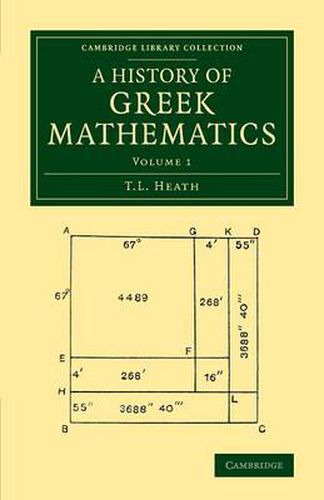Readings Newsletter
Become a Readings Member to make your shopping experience even easier.
Sign in or sign up for free!
You’re not far away from qualifying for FREE standard shipping within Australia
You’ve qualified for FREE standard shipping within Australia
The cart is loading…






‘If one would understand the Greek genius fully, it would be a good plan to begin with their geometry.’ As early as the sixth century BCE, Thales of Miletus used geometrical principles to calculate distance and height. Within a few hundred years, Euclid had produced his seminal Elements, which was still used as a textbook when this two-volume work was first published in 1921. A distinguished civil servant as well as an expert on ancient Greek mathematics, Sir Thomas Little Heath (1861-1940) includes here sufficient detail for a modern mathematician to grasp ancient methodology, alongside explanatory sections aimed at classicists. This remains a rigorous and essential exposition of a vast topic. Volume 1 includes an introduction that touches on the conditions which made possible the rapid development of philosophy and science in ancient Greece. The coverage begins with Thales and ends with Euclid.
$9.00 standard shipping within Australia
FREE standard shipping within Australia for orders over $100.00
Express & International shipping calculated at checkout
‘If one would understand the Greek genius fully, it would be a good plan to begin with their geometry.’ As early as the sixth century BCE, Thales of Miletus used geometrical principles to calculate distance and height. Within a few hundred years, Euclid had produced his seminal Elements, which was still used as a textbook when this two-volume work was first published in 1921. A distinguished civil servant as well as an expert on ancient Greek mathematics, Sir Thomas Little Heath (1861-1940) includes here sufficient detail for a modern mathematician to grasp ancient methodology, alongside explanatory sections aimed at classicists. This remains a rigorous and essential exposition of a vast topic. Volume 1 includes an introduction that touches on the conditions which made possible the rapid development of philosophy and science in ancient Greece. The coverage begins with Thales and ends with Euclid.